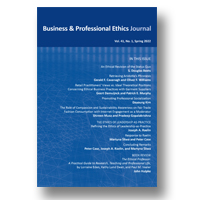|
1.
|
Business and Professional Ethics Journal:
Volume >
43 >
Issue: 1
David E. Desplaces, Laura Beauvais, Avi Kay, Susan Bosco
Understanding Unprofessional Conduct of Faculty
abstract |
view |
rights & permissions
| cited by
Although researchers have paid much attention to the widespread cheating by students during their college careers and the possible sources behind such unethical behaviors, there has been less attention given to the unethical behaviors of faculty. Research on the types of unethical behaviors of faculty has pointed out the unique nature of higher education and the particular pressures placed on faculty as potential drivers of such behavior. In this paper, we examine the factors and underlying cognitive processes that may drive faculty to engage in such behaviors. Specifically, we identify potential drivers of faculty unethical behavior, the cognitive processes activated by these drivers, and the types of behaviors that are considered most ethically questionable among faculty as they carry out their professional roles. We conclude with research considerations and implications of faculty misconduct on the profession.
|
|
|
2.
|
Business and Professional Ethics Journal:
Volume >
43 >
Issue: 1
Anne I. Schaap, H. C. W. de Vet, Margreet M. Stolper, A. C. Molewijk
Conceptualization and Operationalization of the Concept of Moral Craftsmanship:
Developing a Questionnaire for the Dutch Prison Context
abstract |
view |
rights & permissions
| cited by
Prison work creates ethical challenges for which a training program was initiated for Dutch prison staff to foster their Moral Craftsmanship (MCS). The concept of MCS is not yet defined and operationalized in literature. This explorative study aims to 1) define MCS, 2) identify conceptual elements of MCS, and 3) develop a measurement tool for MCS. A document and literature study provided input for the definition and selection of conceptual elements related within DCIA policy documents, identifying three conceptual levels of MCS: individual (cognition, attitude, and actions), team, and leadership. This first MCSQ consists of seventy-one items distributed across the domains: values and norms, judgment and reasoning, consultation, implementation, looking back, interactions, and leadership. We tested its usability via ‘think-aloud interviews.’ Validation of the current version of the MCS-Questionnaire and consensus among experts about what to include or exclude in the concept of MCS are needed for further development.
|
|
|
3.
|
Business and Professional Ethics Journal:
Volume >
43 >
Issue: 1
Brian K. Steverson, Adriane Leithauser, Tyler Wasson
Trading In Our Lederhosen for Kilts:
The Ethics of Marketing Direct-to-Consumer Genetic Ancestry Testing
abstract |
view |
rights & permissions
| cited by
The popularity of direct-to-consumer genetic ancestry services has exploded over the past five years, with as many as 250 direct-to-consumer genetic ancestry testing companies currently operating and estimates that 1 in 5 Americans are customers of one or more of those companies. Marketing of genetic ancestry testing has consistently linked the results of DNA testing to a consumer’s racial and ethnic identity, and, because of that, can help consumers find out “who they really are.” We argue that the “biologization” of race and ethnicity promoted in such marketing violates norms of marketing ethics. In particular, we show that this marketing technique violates a number of the core commitments and values of the American Marketing Association Statement of Ethics.
|
|
|
4.
|
Business and Professional Ethics Journal:
Volume >
43 >
Issue: 1
Andrés Felipe López Latorre, Ulf Thoene
Corporations as Imperfect Communities:
Toward a Theory of Business and Human Rights
abstract |
view |
rights & permissions
| cited by
This article presents an alternative understanding of corporations from the two problematic visions that see corporations as either the shareholders’ property or as nexuses of contracts. The alternative proposed here is based on the theories of pre-eighteenth-century philosophers, particularly Aristotle’s political philosophy, which Thomas Aquinas later refined. The article aims to advance a theory of corporate legal and moral responsibility for human rights based on the conception of corporations as imperfect communities whose purpose is to produce a good or service through participatory work that allows individuals to self-develop while contributing to the community by satisfying consumers’ needs through collaborative work. The critical account of corporations presented here provides a sound foundation upon which to build a justification of corporate responsibility for human rights violations, providing a more accurate description of the reality of a corporation than most mainstream contemporary accounts do.
|
|





